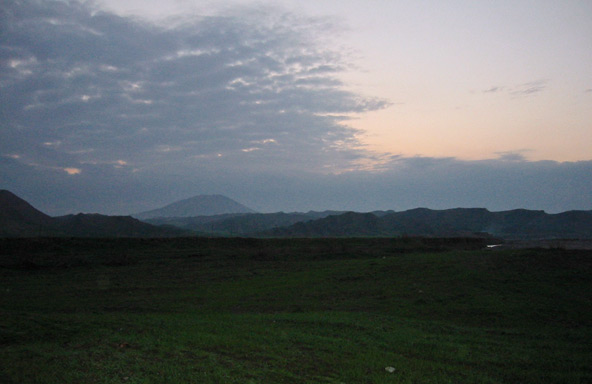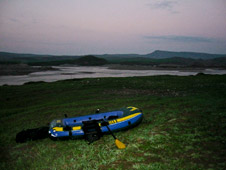
12 March 2003, Iraq. I made a hilarious satellite telephone call to my editor, Ed Lempinen in San Francisco and told him that I had made it inside Iraq without mishap.
Photo: Phillip Robertson
Since arriving in Syria more than a week ago, I had tried everything to get into Iraq, including a quick trip from Qamishli in the northeast corner of the country down to Damascus to ask the Iraqis themselves for a visa. On Monday, March 10, the day I arrived at the Iraqi Embassy, the United States was lobbying a large number of countries around the world to eject Iraqi officials. Men were moving around the building quickly, speaking in urgent tones. An Iraqi asked me to leave the main visa section that was crowded with old people with passport problems and directed me to the embassy gates. A lock buzzed and I walked through into the interior of the building. Inside, a guard watched an impressive array of video monitors, which had views from every corner of the building cycling every few seconds. After a few minutes, an English-speaking Iraqi diplomat appeared and ushered the special visa cases into a room inside the embassy. There were two other applicants, a photographer from the U.K. and a young man wearing a white skullcap.
The Iraqis usually sit on press visas for two weeks and route the request through the information ministry in Baghdad, but peace protesters get them the same day. The thought of getting a visa in a single day had haunted me, particularly after the bureaucratic problems with the Syrian secret police, who had denied me permission to cross the river into Iraqi Kurdistan. In the end the temptation of a quick visa was too great, so I made up a story the Iraqis might buy.
Mr. Safah, the English-speaking diplomat, was so turned on by the thought that an American would walk in off the street and ask to be placed in an Iraqi installation that he asked me three times. "Are you sure you are not interested in being a human shield?" I raised my hands and said, "I'm so sorry," I said it as if it was something I would do if it were even remotely possible. Then Safah asked me if I was a journalist. "Absolutely not," I said. The lie shot out like a mouse. I said I was a peace protester and wanted to visit Iraq to meet up with some friends in a peace group, and the lie bent back on itself, became more complicated, and required a host of details to fill gaps in the story. The telling of it felt rickety and unsupportable, but it just kept on coming. It wasn't smart to mention any names of people I knew in Baghdad, and I drifted into the land of bad liars. I told the official that I was an independent protester. Safah then wanted to the know names and addresses of friends in Baghdad. Surely I had some, he said. There was a pause.
Safah leaned in close and explained that I could go that very day if I agreed to be a human shield. "You can get the visa today, no problem," he went on. "You can be there tonight." I thought he meant that the Iraqi government would pay for the trip. He seemed anxious, perhaps because he had suffered a dispiriting exodus of human shields out of Iraq in recent days and needed to up the count a little. "No human shield?" he wanted to know for the last time. "Now, please write down your reasons for going to Iraq." We sat and wrote under the buzzing fluorescent lights and a giant portrait of Saddam. I wrote a vague and hopeful paragraph about peace in careful block print, then signed and dated it.
Saddam's oversize wall portrait blurred and shuddered into an image of an authoritarian principal from childhood named Mr. Knee. Safah then took my letter and looked it over and said, "I'm so sorry. I can't read this very well. Will you read this out loud for me please?" I read the statement for the small audience, and it was hopeful and vague and didn't say much at all. Seemingly satisfied that I'd made some sort of quasi-public declaration, Safah took the page and left the room for an hour. The special cases sat in silence while Mr. Knee scrutinized the room through the dead air for weaklings and dissenters. It was hard to breathe.
The British journalist said when we were left alone that the human shields could do anything they wanted during the day, but had to sleep in an Iraqi installation at night. Then Safah came back in with forms and we wrote down our passport particulars.
Across from me sat the religious man from Yemen who was also in our special visa group. The Iraqis dealt with the Westerners first and saved his case for later. The man in the white skullcap sat through the whole process looking meek and distracted. An older friend sat with him to make sure the deal with the Iraqis went smoothly, answering for him when Safah asked a question. I had the feeling the young man was being put up to it, but all the negotiations for his trip to Iraq were being conducted in Arabic, and the officials spoke very quickly and asked him to wait. They had wanted to talk to us first. A fat official then came into the room and read a long list of names over and over again, turning pages at regular intervals. When he reached the end of his list of names, he started over.
 LEAD IMAGE: 12 March, 2003, Iraq. I crossed the Tigris river from Syria to Iraq in an inflatable boat. It was cold night and I was slightly worried about drifting downstream into Saddam-controlled territory. Once across the river it seemed wise to wait for dawn to break before moving around. Shortly after these pictures were taken, a man in dump truck gave me a ride to Dohuk, Kurdistan.
LEAD IMAGE: 12 March, 2003, Iraq. I crossed the Tigris river from Syria to Iraq in an inflatable boat. It was cold night and I was slightly worried about drifting downstream into Saddam-controlled territory. Once across the river it seemed wise to wait for dawn to break before moving around. Shortly after these pictures were taken, a man in dump truck gave me a ride to Dohuk, Kurdistan.Photo: Phillip Robertson
© Phillip Robertson, 2009-2014.
